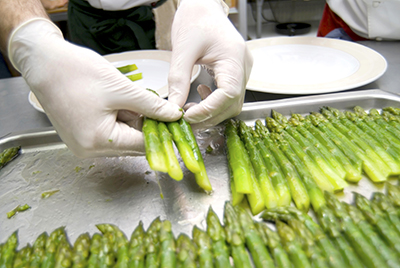| | Food safety in the kitchen | Special insurance requirements | Emergency response requirements | Building a successful rental agreement | Designating a rental coordinator
This factsheet outlines four areas where you can mitigate risk: food safety, special insurance, emergency response requirements and building a successful rental agreement.
Although commercial kitchen renters are responsible for their own food safety training and insurance, you will need to ensure you have done your due diligence to manage risks in the kitchen.

Food safety in the kitchen
When food is prepared and served to the public, Alberta Health Services (AHS) may require you to take additional precautions to ensure the actions performed in your kitchen follow safe food handling procedures.
Risk can involve physical as well as regulatory factors.
The following are scenarios when you (as the facility broker) will need to involve AHS to one degree or another:
- If a community group (like a soccer team or a church group) holds a fundraiser or a potluck in your kitchen, but serves food only to their own group, they do not need a food handling permit or a health inspection. They do need to register the event with AHS, so they can receive a checklist of food safety information.
- If an organization wants to prepare catered food from your commercial kitchen, that organization would need to contact AHS directly to complete an application for a food handling permit. As part of the permit, AHS will conduct an on-site inspection of your commercial kitchen.
- If a catering company or a home-based food business wants to use your commercial kitchen for food production on a regular basis, you are responsible for securing a food handling permit from AHS (applications are available at Alberta Health Services. Then, the caterer or food business must abide by the facility’s parameters as outlined in the permit. If the kitchen is registered for soup and salad preparation, for example, the caterer cannot cook a multi-course dinner for a large group.
It is important that you contact AHS regarding food handling permits and work with a Public Health Inspector to ensure you are meeting all requirements.

Having the right insurance and being ready to respond to emergencies keeps you competitive.
Special insurance requirements
Your facility likely already has an insurance policy that covers contents and liability. Depending on the rental scenario, you (or the renters) may require additional coverage for the kitchen. Factors that can affect insurance include the type of event in the facility and whether or not alcohol will be served. It is best to investigate your insurance needs on a case-by-case basis.
Emergency response requirements
Safety of your facility and the preparation of safe food are very important. Having the appropriate equipment available and procedures in place will help in providing a safe environment. Ensure that you have a certified sprinkler system or fire extinguishers on site and that all building codes have been met. Set up a first aid station that is well stocked with basic first aid supplies, and have emergency numbers available. Be sure that there is a facility contact name and telephone number available.
Building a successful rental agreement
A written rental agreement is a valuable tool to capture decisions on paper between you and the people or groups renting the facility. A typical agreement would include the details of the rental – times, dates, rates, booking fees etc. – as well as the rights and responsibilities of each party. If you have a multi-purpose facility, you may already have a rental agreement in place for the facility. You will need to check to see if it meets your needs to rent the commercial kitchen. If you need to develop a rental agreement, it is suggested that you seek legal advice.
Setting rental fees is an individual process. You will want to investigate current rates for your type of facility and discover what the market will bear in your community.
To find out more about rental rates for your type of kitchen or facility, you can look into the following:
- get input from other businesses or groups that currently rent out their kitchens
- investigate rates of similar kitchens or halls in other communities
- conduct an online search for community kitchens or commercial kitchens in Alberta
- contact a local church in your community that has a hall or kitchen for rent
Some of the key factors that will affect your rental rate are supply and demand for the service, location, available equipment, whether you are renting the kitchen or the whole facility.
Designating a rental coordinator
Managing all the above details can take time. Depending on how successful you are at renting out your facility, you may find that the kitchen business takes on a life of its own.
If that is the case, you may want to consider a rental co-ordinator on a part-time or full-time basis, either as a volunteer or a paid position. Making rental co-ordination the job of one person – especially as you grow the number of rentals – can be helpful in ensuring important details are completed. Rental agreements will protect you and your clients.
Rental agreements will protect you and your clients.
Prepared by
Alberta Agriculture and Forestry
More information, contact:
Alberta Ag-Info Centre
Call toll free: 310-FARM (3276)
Website: agriculture.alberta.ca
Source: Agdex 845-32. February 2016. |
|